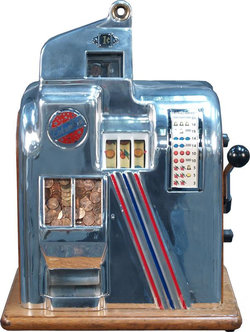- Home
- Replacement Artwork,logos,etc Available
- The Allwin Arcade
- Trade Stimulators
- The Strange & Unusual
- The Aristocrat Collection
- The Bally Collection
- The Bell-Fruit collection
- The BDR/BMR Collection
- The Bryans Collection
- The Buckley collection
- Caille Brothers Collection
- Working Models
- The Groetchen collection
- The Hawtin's Collection
- The Jamieson's Collection
- The Jennings collection
- The Mills Collection
- The NSM (Bingen) Collection
- The Oliver Whales Collection
- The Pace Collection
- The Parkers Collection
- The Rock-ola collection(slot machines)
- The Ruffler & Walker Collection
- The SEGA Collection
- the Shefras collection
- The TH.Bergmann Collection
- The Tom Boland collection
- The Watling collection
- The Whittaker Bros Collection
- the Wondermatics collection
- The Wulff Collection
- The Juke Box Age
- Coin Operated Cranes & Diggers
- Coin Operated Shooting Games
- Coin Operated Weight Scales
- slot machine coins & tokens for sale
- Amusement Arcades from the Past
- The British Seaside Pleasure Pier
- The Market Place
- Coin Operated Related Seaside Postcards
- See a Selection of the More Complex Machines at Work
- Stuart Dale's Imperator Rebuild
- Stuart Dale's Steam Shovel Project
- The "Allwin" Machine
- Useful Links
- The Rye Heritage Ctr Collection of Working Models
- Williamson's Vintage amusement arcades
- Contact Us
The Groetchen Tool & Mfg Co
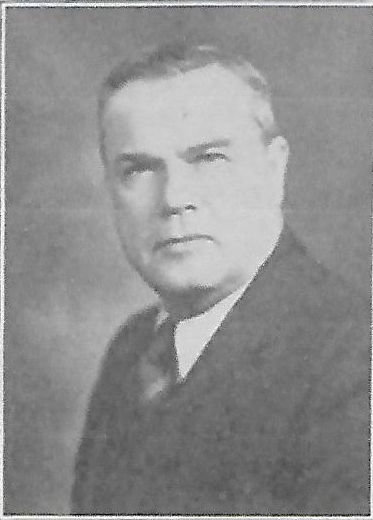
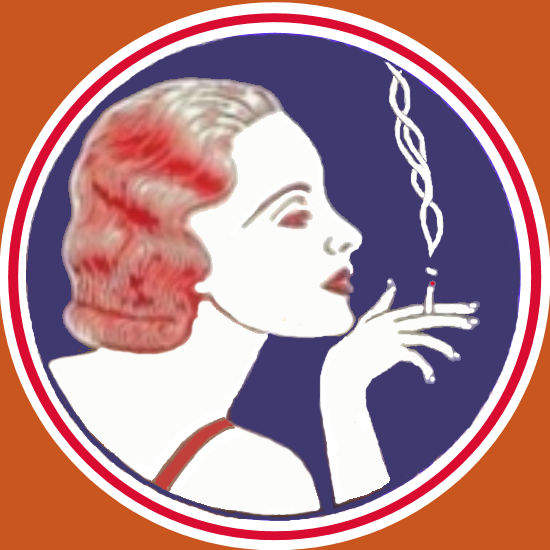
Richard Groetchen 1882-1966 Trade Stimulator insert

The Groetchen Tool Co are a bit of an oddball in the list of coin-operated machine makers, although the words "coin-operated" and "automatic" run right through their history they were far from being just a slot machine maker.
Richard Groetchen was a talented engineer and inventor who patented many varied inventions during his working life. His first mechanical creation came in 1913 and embraced three themes that would reoccur throughout the company's life, food, coin-operated and being just a little different to all the others. For this first machine was a coin-operated hard-boiled egg dispenser.
For the next 18 years, the company expanded making equipment for many large companies but in 1930 they entered the coin-operated amusement machine market with three machines the "21" Vendor, the Dandy Vendor and the little Prince.
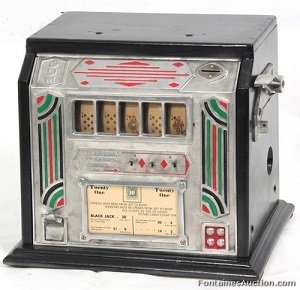
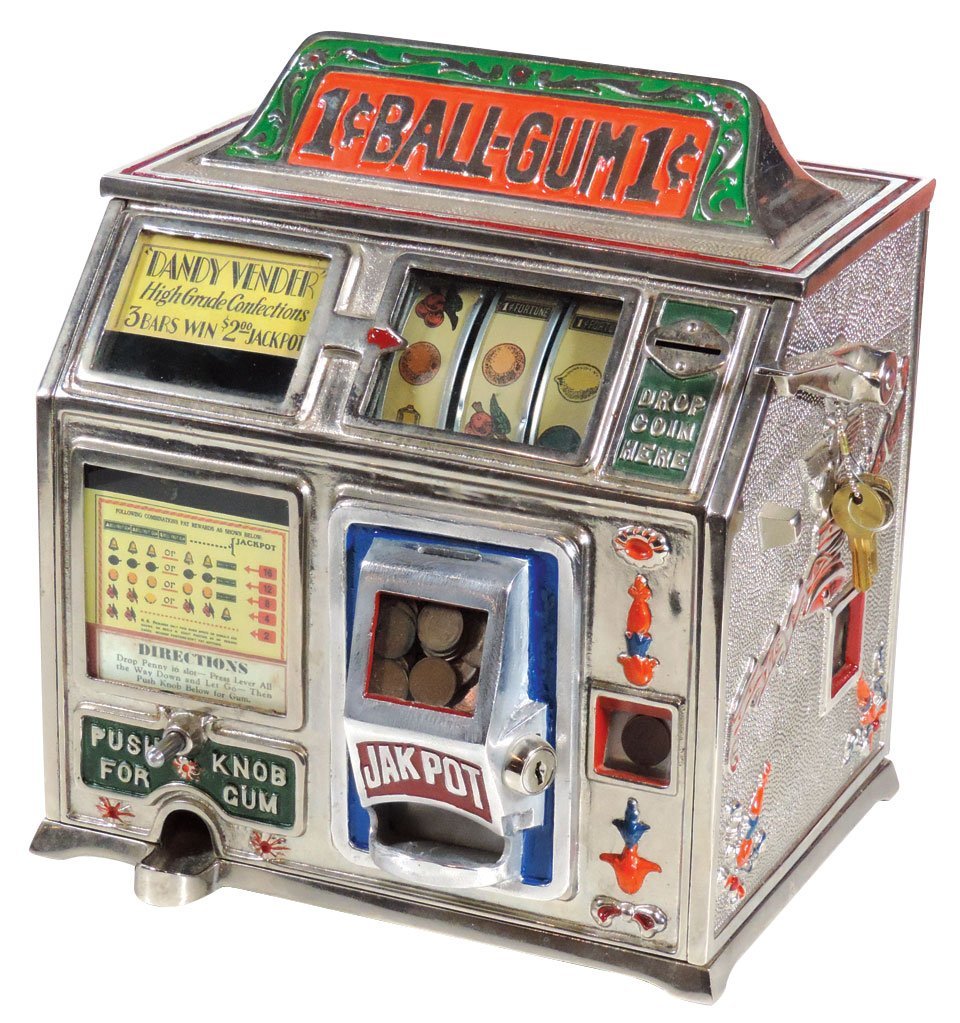
"21" vendor Dandy Vendor
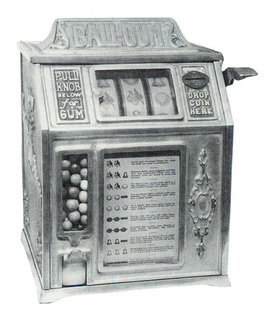
Little Prince
All these machines set the mark for most of the Groetchen machines that would follow in the next 20 years. They were small, they were trade Stimulators and they were a little different from the competition. Over the next five years, they released at least 27 machines, all trade stims, all compact and often using five reels with various reel strips including cigarette packets, tavern themes, playing cards and horse racing themes. Groetchen designed his own type of mechanism which was very small allowing for five reels.
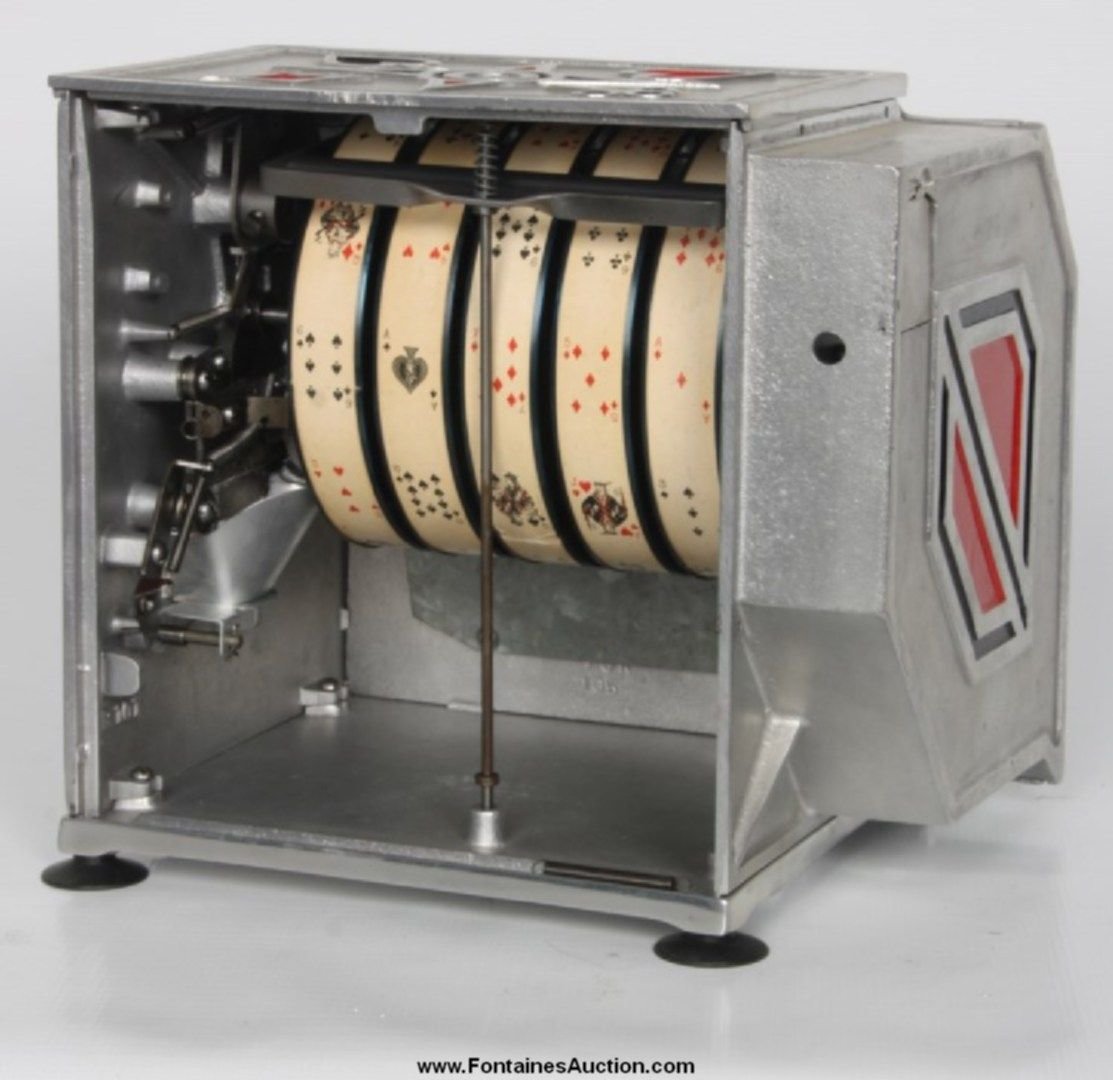
By 1935 Groetchen was one of the market leaders in trade Stims and decided to try their hand at a true slot machine, the mech was expanded to include a payout system and is one of (if not the only) slot machine mechanism that does not resemble the Mills Bell-type in any way. The result was the Columbia and for the next ten years this machine, with various small changes to the case, was their successful flagship slot machine. In true Groetchen fashion, the machine had several unique features.
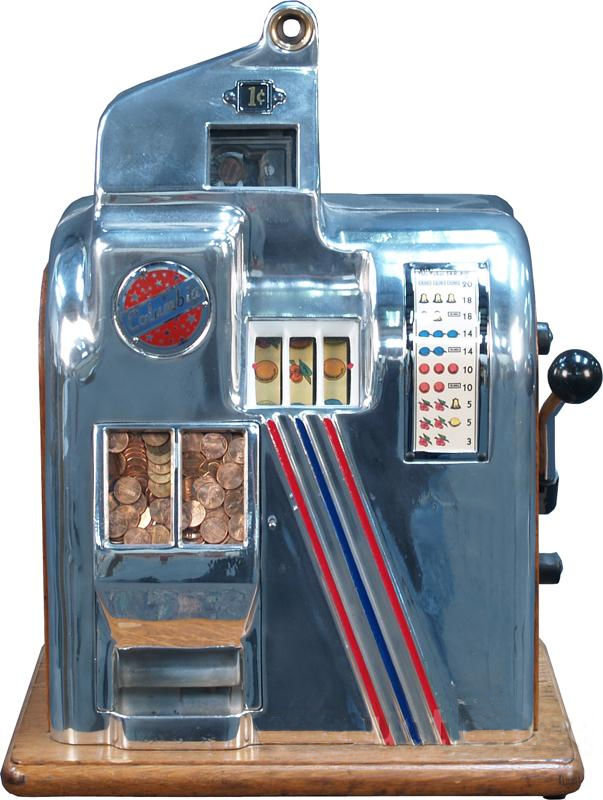
The coin mech was designed to be quickly and easily changed between coin denominations, on-site, by the operator and the machine was sold with several different coin sizes included. Reel strips could be easily and quickly changed on-site allowing for the game to be updated to a fresh look whenever needed.
The payout system was powered by a single rod that moved into the mech at varying distances when a payout was detected, the escalator took the form of a circular glass-fronted reel showing the coins moving around until they dropped into individual slots in a large circular tray that moved one space forward with each pull of the handle. This tray was spring-loaded in the opposite direction to the handle pull movement and when the payout rod released the tray by moving forward on the win the tray retreated the correct number of positions indicated by the win paying out the desired number of coins. This reduced the design needed in the coin entry as far as dud coins needing to be detected because if the player was using slugs to play the machine his winners would be paid in the slugs he had been putting in.
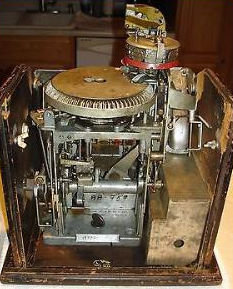
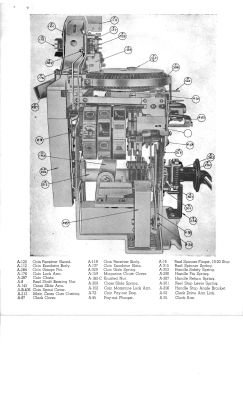
Columbia Mech(note the escalator and payout coin tray)
The Columbia was much cheaper to make(and so sold cheaper) than the standard slot of the day and this was a big part of its success. However, it was prone to jamming. The Columbia was pretty much the only Bandit style slot machine the company ever made with the last versions being released in 1946-48. They made an attempt at another bandit style machine in 1950 with the corona Bluebell but it was not a success.
During WW2, unlike most slot companies, Groetchen were not compelled to cease slot production and switch to war production although they do seem to have halted production of metal machines including the Columbia during the war years, probably due to the shortage of aluminium. They did bring out a few very unique wood-cased machines with a propaganda theme " Poison the Rat" "Kill the Jap" and "Smack a Jap". These machines now considered very much "not politically correct" are very much sort after by collectors and fetch high prices. Interestingly "Poison the Rat" came out a good year before the USA entered the war in 1941.
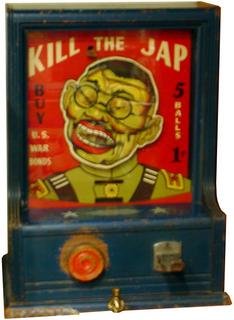
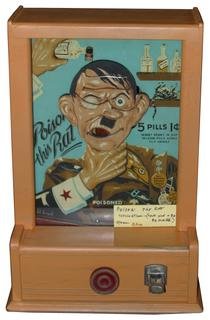
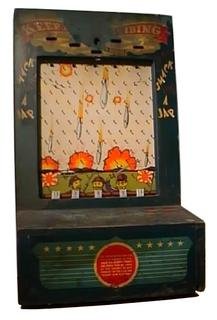
Kill the Jap 1943 Poison the Rat 1940 Smack a Jap 1941
During this wartime period, they also produced several other very successful wood case machines, notably "Pikes Peak" and "Skill Jump" as well as, quite surprisingly to UK collectors, at least two Allwins "Zoom" and "skill Shot."
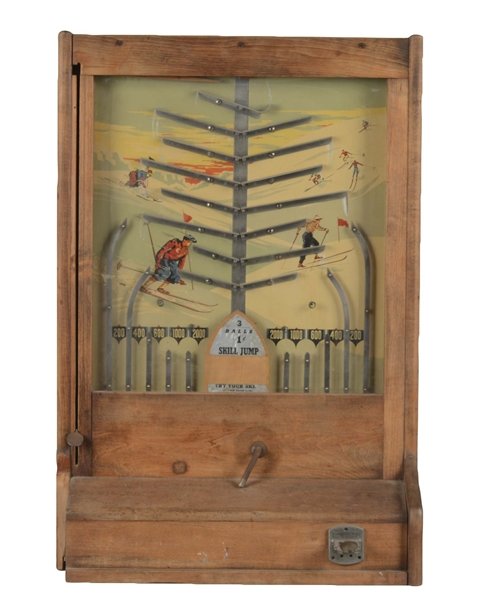
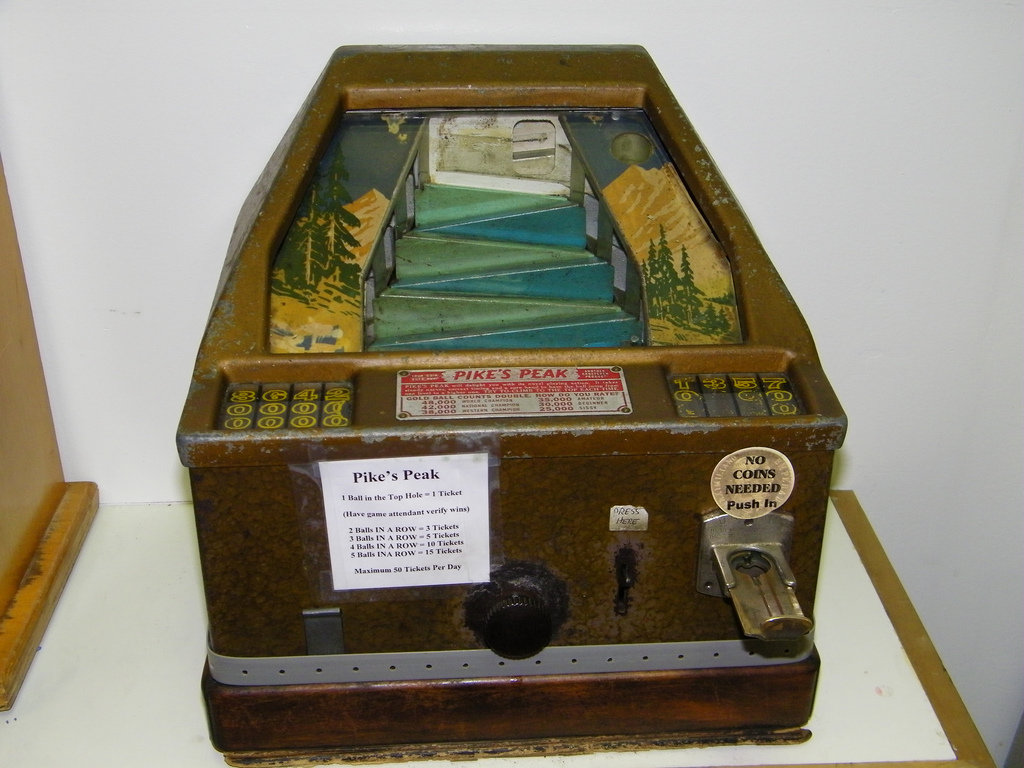
Skill jump 1940 Pikes peak 1941
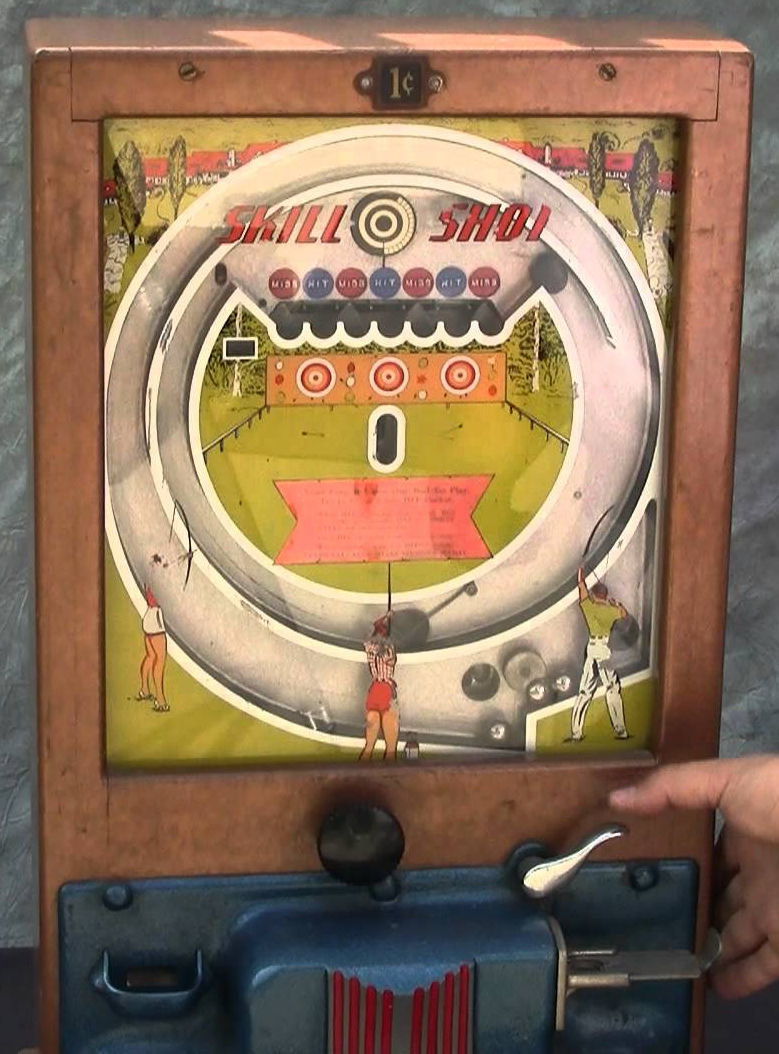
Skill Shot 1940
Interesting to see this machine in action, it has an interesting coin entry for an Allwin it also has a reserve ball feature much like the British "Electric Amuser". It also has (typically for Groetchen) one, I think) unique feature for an Allwin, a tilt mechanism. Also, some of the artwork was directly placed onto the glass, an idea not used in the UK on Allwins, this must have given the machines a nice 3D look. (see it in action page top left.)
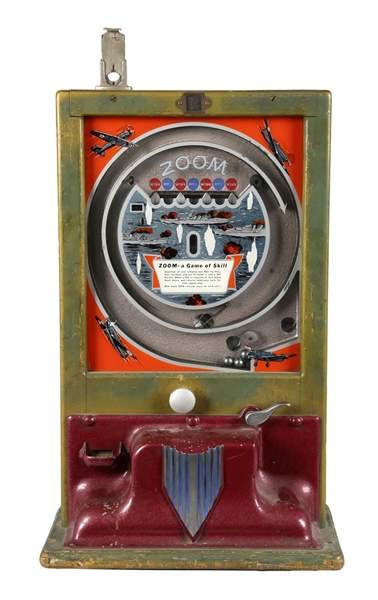
Zoom 1940
Also during the war years, Richard Groetchen started to look again at automated cooking equipment patenting several cookers in 1943 including early rotisseries and rotary broilers. After the war he owned and operated a very upmarket restaurant called the Grotechen in Madison Ave New York and was clearly thinking the automatic food cooker was the way to go, At a trade fair in 1947 he personally demonstrated his steak cooker and handed out free steaks to all comers.
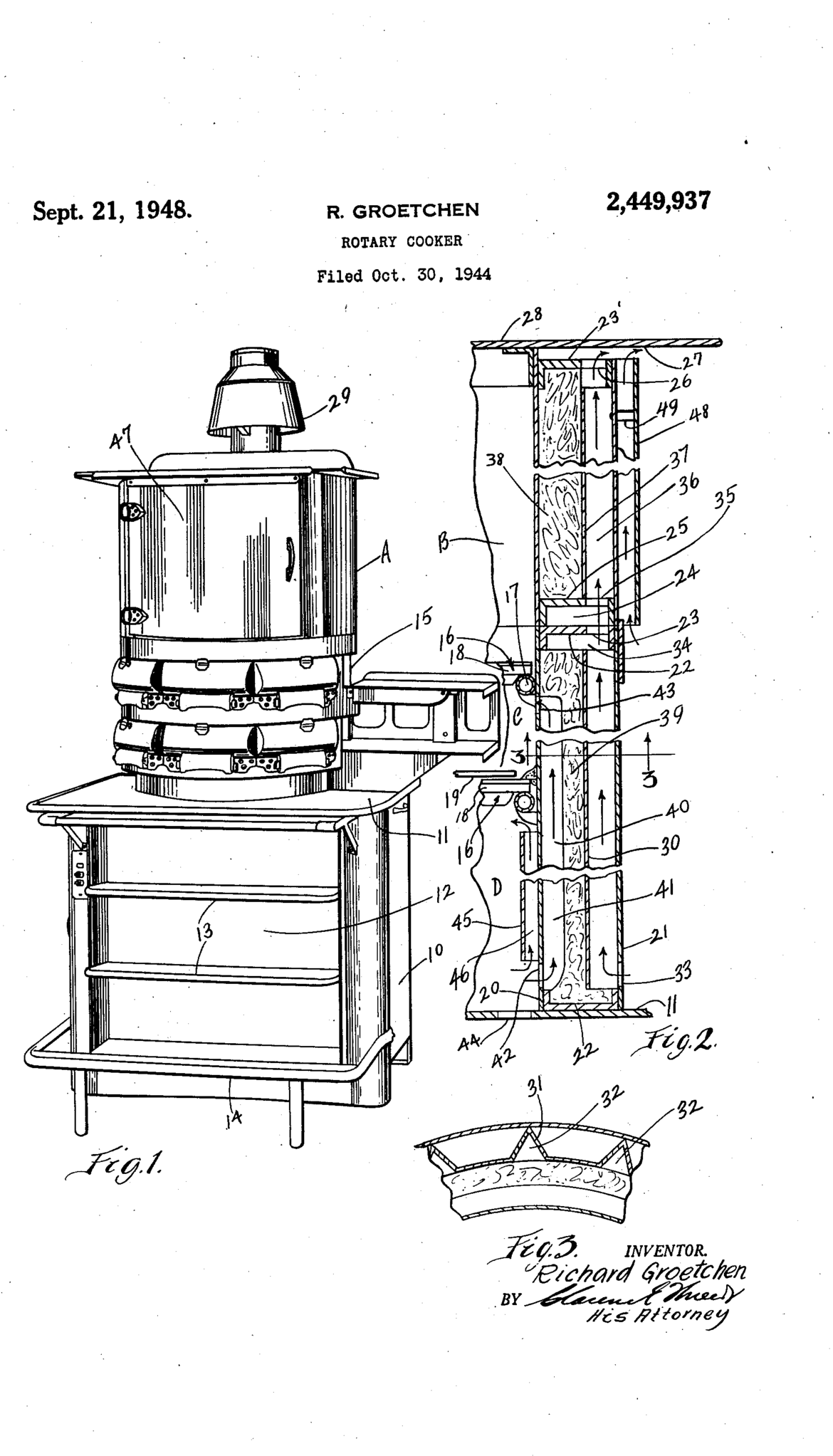
Grotechen Rotary Cooker Patent 1948
The company was still interested in making slots, especially trade stimulators. Grotechen and several other makers mistakenly believed that the failing trade stim market would boom again after the war with demand for new machines to replace the old worn out machines from before the war. This was a huge mistake, despite launching five new models including the rather nice "wings" the public's interest had moved on and the demand never returned
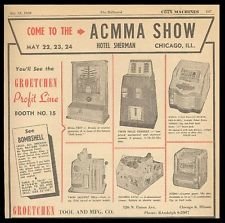
In 1947 the company launched a very modern 3D viewer called "Look" which was available as battery-operated or mains and what was pitched as "the smallest slot machine ever" the "Atom/Imp"
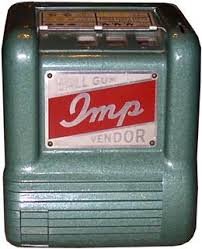
The Imp Vendor
but both failed to impress and with one last try with the very interchangeable Corona Blue Bell the company moved out of slot production in 1950 and Richard sold his factory and tooling to the Herbel Corp in 1951 by which time they were mostly making ice cream cabinets. Richard, not ready to retire although aged 69, then rented space in his own old factory from Hebel and founded Grotechen Broil-a-Matic making automatic cookers.
In 1954 an advert in Billboard shows Grotechen Broil-A-Matic selling off their stock (including old slots) in a "must vacate building" sale.
Richard Groetchen died in California in 1966 aged 84 leaving behind him some of the nicest and most unique coin-operated machines ever made.
A few Groetchen Machines
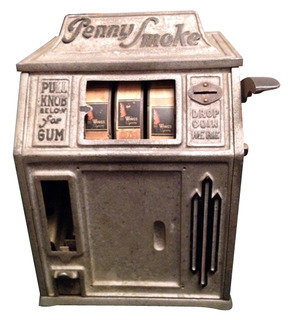
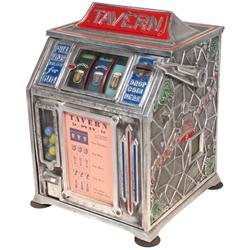
The Penny Smoke The Tavern
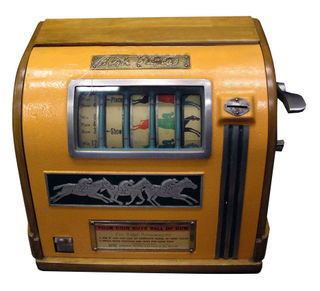
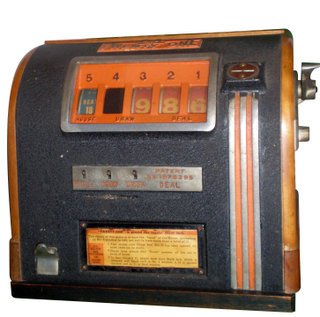
High Stakes(note the unusual reel strips) Blackjack (this cleaver machine used hidden windows to create a blackjack score
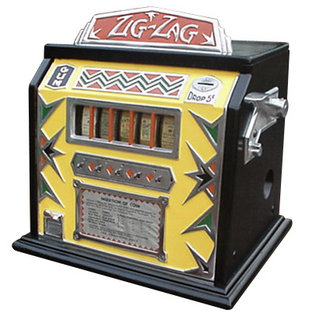
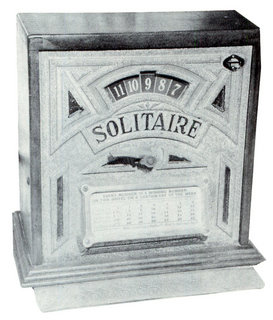
The very nice looking "ZigZag" The rare "Solitaire"
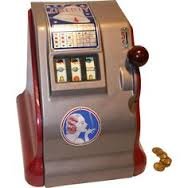
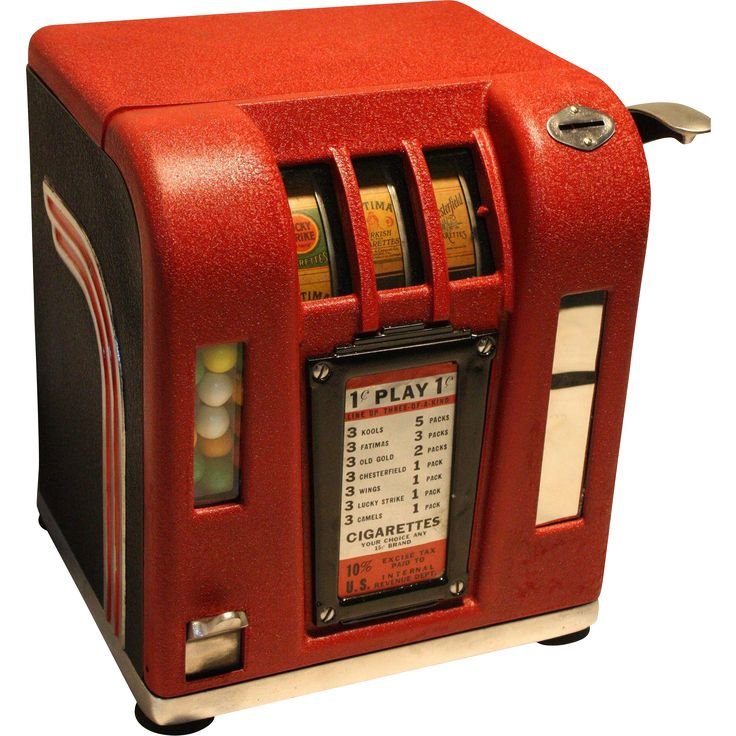
Liberty Bell Zephyr
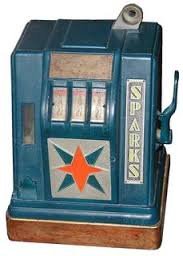
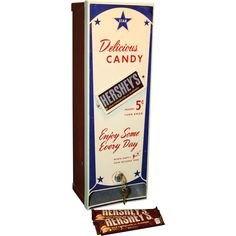
Sparks Candy Vendor
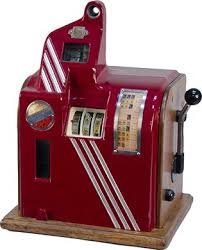
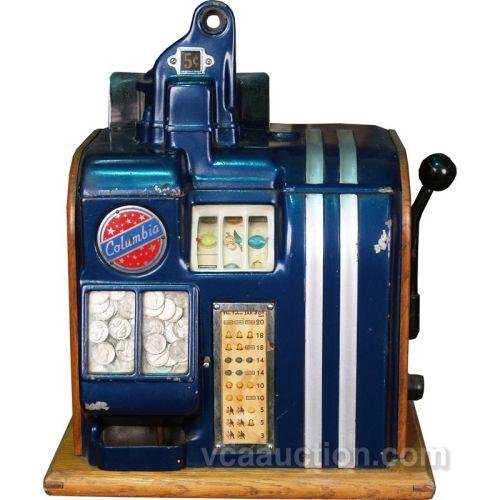
Columbia(Vendor only) Columbia double jackpot
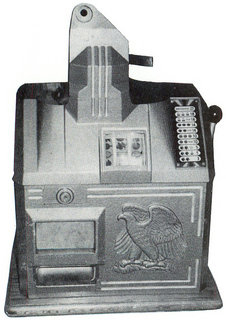
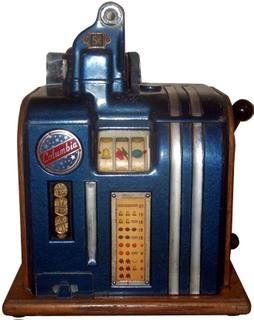
Eagle (1948) Gold Award
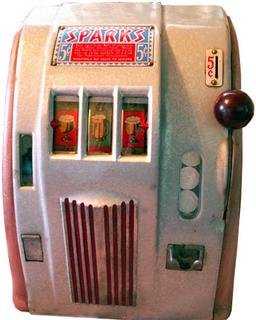
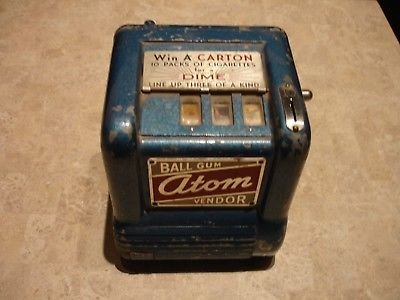
Sparks "club" with tavern reels the last of their trade Stims "Atom"
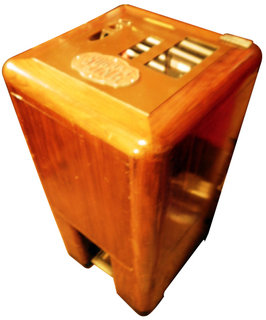
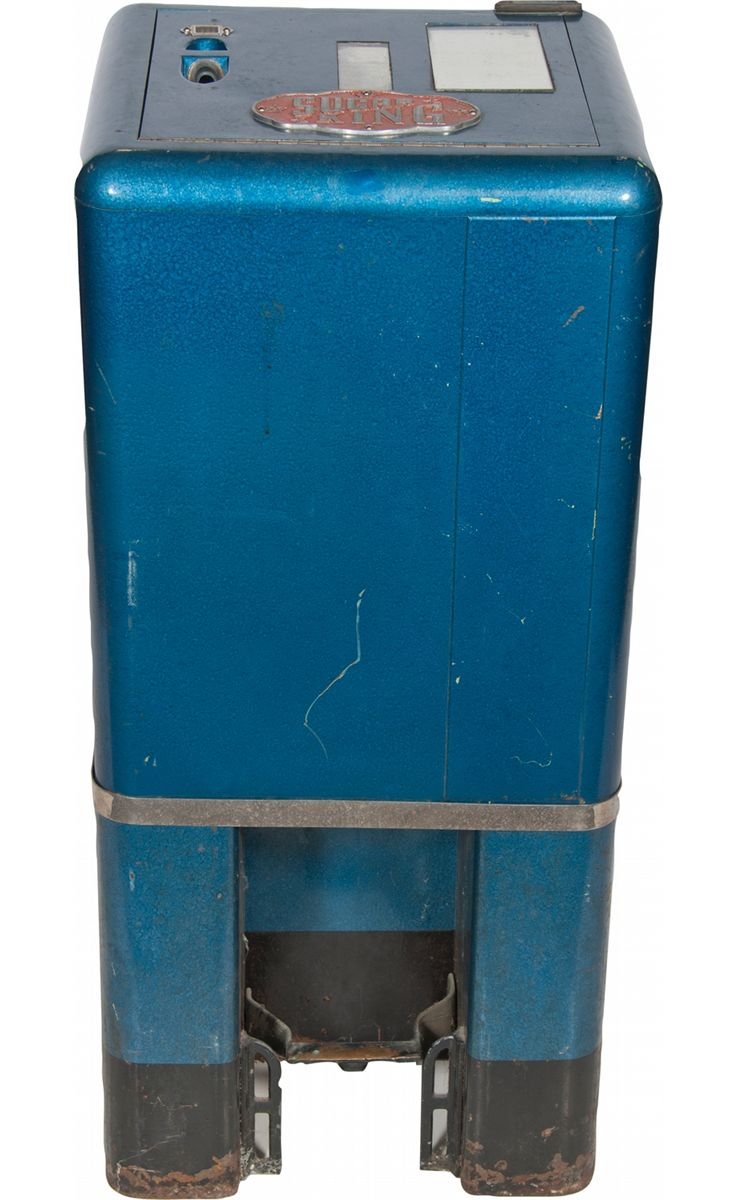
The Sugar King
this wartime console machine usually had a wooden case, the metal case one on the right is most likely post-war
This well-made machine used a standard Columbia mech hooked up to an electric flasher unit to replace the reels
(see the video top left)
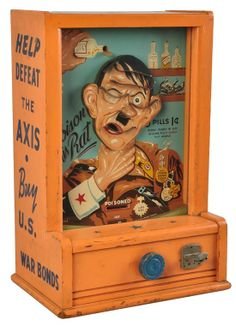
Note the clever attempt to make players think they were helping the war effort by playing "Poison the Rat"
Flyers
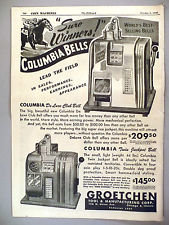
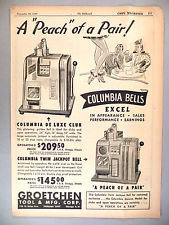

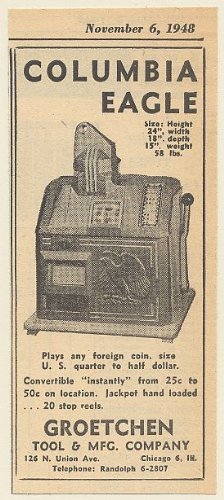
"Look" 3D Viewer (1949) Eagle (1948)
A bargain at $29.50 inc 1 set of 9 "risque" 3D photos
